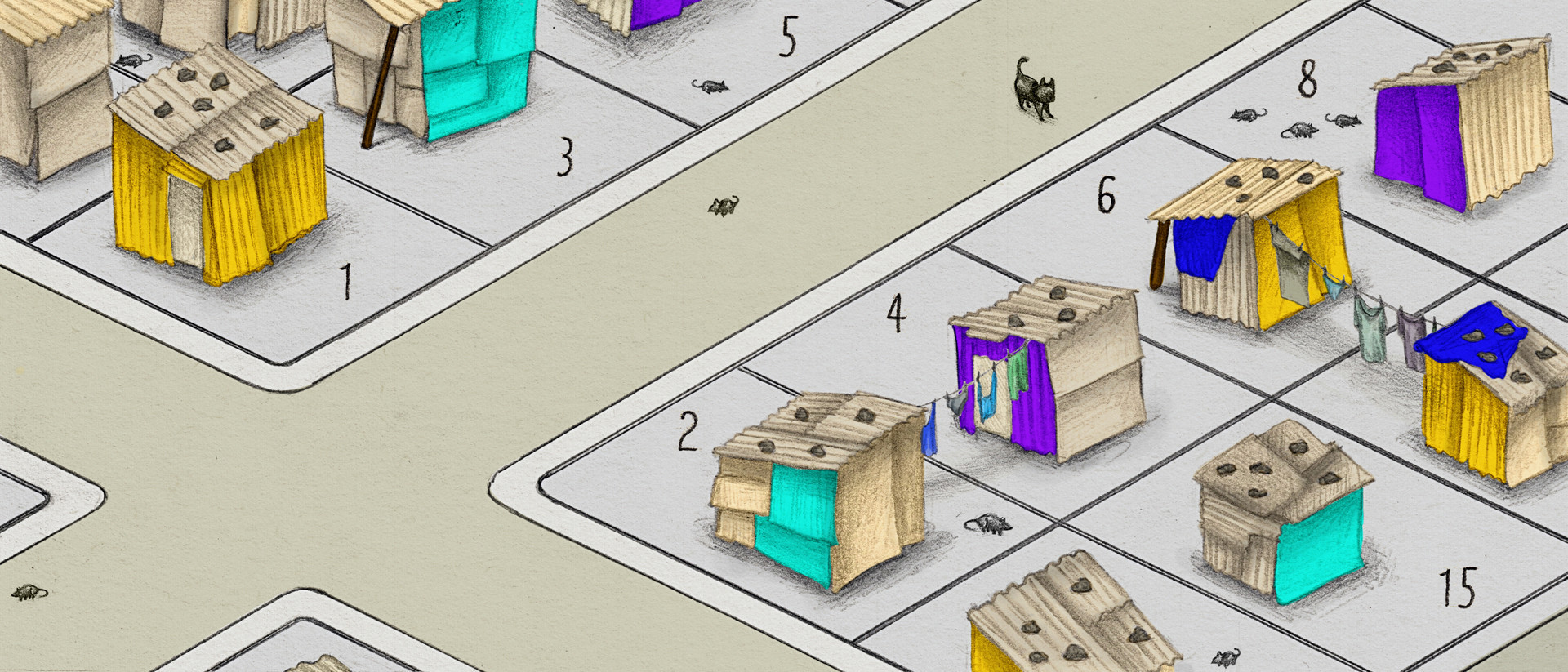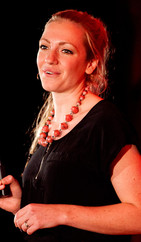“Chicken?”
Sony Lebrun stands at the small, smoking grill – green shirt, silver neck chain, tattooed arms. We’re in Caradeux, one of the biggest slums in Port-au-Prince, Haiti’s capital. I’m tired after a long day of walking and sink gratefully onto the plastic stool he pushes my way with his foot.
I don’t know it yet, but he’s about to tell me what charities have been doing wrong for years, why he’s still poor, and how we can save the world.
“Do you live here?” I say.
“Yes, over there.” He points his spoon at a shack with a corrugated roof, walls made from advertising signs, and – unusual for this neighborhood – a window, salvaged from a bus, frame and all.
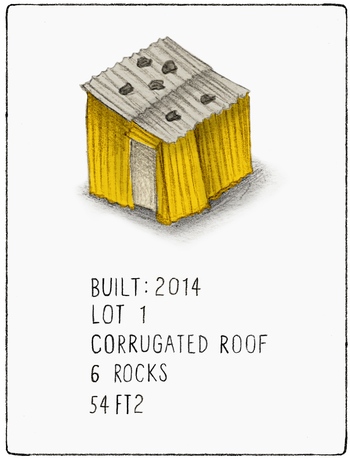
“Have you been here long?”
“Since the earthquake.”
That was five years ago. In the meantime, billions of euros in aid money have been pumped into Haiti, including millions from the Netherlands. Yet Lebrun – along with more than half the country’s population – still lives below the poverty line.
“If you could name one thing that would really change your life, what would it be?” I say. I’m expecting him to say a better house, or more food, or a doctor, or education for his kids. I’m expecting him to mention one of the things relief money often provides.
But Sony Lebrun grins broadly at me, revealing a missing tooth, and says, “What would help me most? A land registry.”
I assume I’ve misheard.
“A land registry,” he repeats, smiling.
A land registry. An agency where you can officially affirm that the land you’re building your house or planting your food on is your own. Lebrun would love to build a brick house, he says. He wants to save up for the materials. But what if someone shows up at his door one day claiming to own the land? His savings would be gone in a heartbeat.
What Lebrun needs is security – security he can build a future on. And he needs agencies to safeguard that security. What Lebrun needs is bureaucracy.
Bureaucracy? Yuck!
When you look up the b-word on Merriam-Webster.com, two of the three listed definitions aren’t exactly inspiring. First comes definition 1: “a: a body of nonelective government officials; b: an administrative policy-making group.” And definition 3 is worse: “a system of administration marked by officialism, red tape, and proliferation.”
That’s bureaucracy in its infamous guise: endless forms, pen-pushers, file cabinets, boring reports. Bureaucracy is pointless complexity, long waits, going from pillar to post, purple crocodiles. Bureaucracy: the less of it there is, the better.
Bureaucracy is the office where you go to get a building permit. It’s the agency that helps you set up a small business quickly and easily.
But hang on. Look at definition 2: “government characterized by specialization of functions, adherence to fixed rules, and a hierarchy of authority.” Bureaucracy is also the system that organizes everything into procedures that are the same for everybody. It’s what holds societies together. It’s not excessive, it’s indispensable.
Think about it. Bureaucracy is the office where you go to get a building permit. It’s the agency that helps you set up a small business quickly and easily. It’s the reliable statistics office that ensures government policies are based on sound data. Bureaucracy, in short, is all the fundamental building blocks of civilization we have the luxury of taking for granted.
Let’s hear it for bureaucracy
These days, a Westerner can hardly imagine how complicated the world would be without bureaucracy. But try to picture it: living without an address, without a Social Security number. Could you open a bank account? No. Start a business? No way. Register to vote? Never.
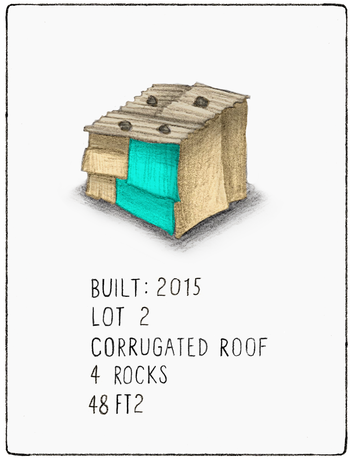
And yet approximately 4 billion people around the world have no address.
And imagine having no proper tax authority. Without one, a government loses out on billions of dollars of potential revenue. There’s no money for social services or infrastructure. Poor people stay poor.
The Netherlands has 1.7 tax inspectors for every 1,000 residents. In sub-Saharan Africa, the figure is 0.037 per 1,000 people.
Imagine a world without deeds of ownership – papers that prove you own your house, your car, the goods you’re selling. For poor people in developing countries, these papers are nigh on impossible to get. The Peruvian development economist Hernando de Soto made a valiant attempt. Registering the homes of poor people in the Philippines sometimes took 13 years and sometimes 25, with a total of 168 separate steps. In Egypt, 77 steps involving 31 offices were required to secure a building permit.
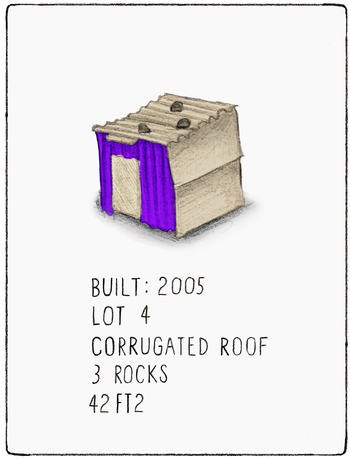
In fact, poor people own much more than they’re able to prove on paper. In Cairo, for example, they have $241.4 billion worth of unregistered property, according to De Soto. In his book The Mystery of Capital (2000), he puts this figure into perspective: it’s six times all the money held in Egyptian savings accounts, 30 times the market value of every publicly listed company in Cairo, and 116 times the value of all Egypt’s privatized former state companies. It is, in short, a vast sum. And yet it’s of limited use to the poor. Without papers proving ownership, you can’t record the sale of your property or use it as collateral to secure a loan.
The evidence is ample: bureaucracy – and the security that comes with it – is what poor people need to climb out of poverty.
Donating bureaucracy
Development organizations are starting to take notice. Along with food, schoolbooks and mosquito nets, one agency after the other has started donating paperwork, Excel sheets and bookkeeping courses. They call it “capacity building.”
For instance, the OECD sends idealistic experts from the group Tax Inspectors Without Borders to help developing countries. Because poorer nations don’t just suffer from a shortage of tax inspectors: they also often lack the knowledge needed to bring crafty multinationals to book.
Farmers who owned their land on paper invested more.
British tax veteran Lee Corrick went to Kenya in 2011 to train local inspectors. For years, the Kenyan tax office had had problems with a big multinational company – something to do with tea auction license rights and letters of credit. It sounds overly complicated, and the Kenyans thought so too. But after two workshops with Corrick and a stern talk with the multinational, the Kenyan tax office managed to collect $23 million. In fact, revenues from Kenyan tax inspections doubled after Corrick came to town. And in Colombia, the take increased tenfold after training.
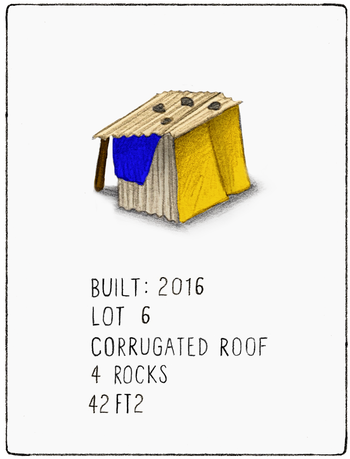
And the effects of Lebrun’s longed-for land registry are being studied in a growing number of developing countries. A few months ago, World Bank researchers published a paper containing the first results of an experiment in Benin. In one area, farmers’ land was officially added to a land registry; in another, it wasn’t. The researchers then looked at how the farmers used their land.
Here’s what they found: farmers who owned their land on paper invested more. For example, they more often planted trees, such as oil palms, that would continue to provide income all their lives. And since they no longer feared their land would be snatched out from under them, they spent less time guarding it. That left them more time to do other things – like earn money. Similar results have been seen in Rwanda and Ethiopia.
Why doesn’t Haiti have a land registry?
The big question, then, is: why, in spite of all the aid money and relief organizations, does Haiti still not have a land registry? If development economists and slum dwellers like Sony Lebrun are calling for bureaucracy outright, why don’t we all – aid organizations, governments, companies – get behind it 100%?
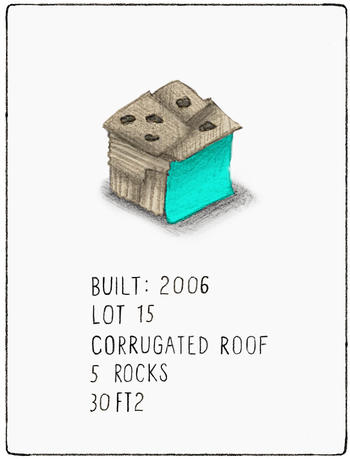
The answer is simple. Bureaucracy is boring.
To convince people to donate money and persuade taxpayers their money is being well spent, you need pretty pictures. A TV ad showing a sweetly smiling Haitian girl who’s just gotten her first school uniform works better than one with a blah bureaucrat in a fluorescent-lit office drawing lines on paper with a ruler. Pictures of starving children with distended bellies still bring in the most money, research shows. And so all too often, capacity building remains the neglected stepchild.
© Kwennie Cheng
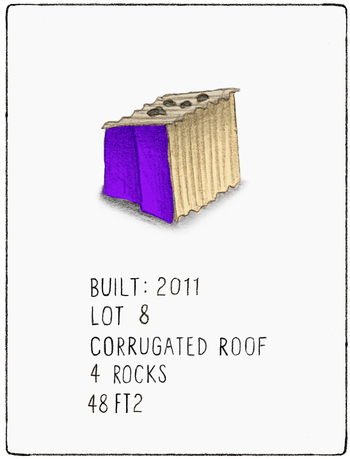
But the truth is, real progress is a gradual, thoroughly bureaucratic, deadly dull process. Saving the world isn’t sexy.
We need to update our image of what it looks like to change the world. The superheroes aren’t the people handing out well-intentioned teddy bears to smiling toddlers; they’re the nondescript worker bees printing out forms in gray offices.
Yes, it’s invisible work. Yes, it’s boring. But the people who will genuinely save the world won’t have throngs of kids hanging onto their superhero capes. The people who will save the world will sit hunched over heaps of files, stamping one certificate after another, sporting an office pallor. The people who will save the world will give Sony Lebrun what he wants: the bureaucratic security he needs to build a future.
— English translation by Laura Martz and Erica Moore
More from De Correspondent:
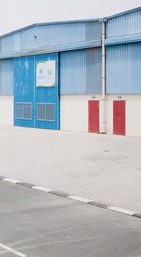 Nearly all the world’s relief supplies
pass through this desert
In an unlikely spot in the middle of the desert lies the world’s largest stockpile of humanitarian relief supplies. Blankets, tents, buckets, and bodybags await the next big disaster. But why here, in Dubai? A travel log from a surreal place.
Nearly all the world’s relief supplies
pass through this desert
In an unlikely spot in the middle of the desert lies the world’s largest stockpile of humanitarian relief supplies. Blankets, tents, buckets, and bodybags await the next big disaster. But why here, in Dubai? A travel log from a surreal place.
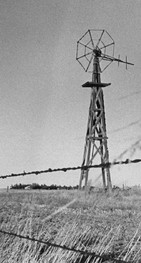 Never before was so much of the world fenced off by barbed wire
Since its invention a century and a half ago, barbed wire has left a trail of blood in its wake. Developed to keep livestock in or out, it was swiftly put to use to divide humanity into the haves and the have nots. If Google Maps were honest, it would now show barbed wire everywhere. I took a look at how things got to this point: a brief history of the Devil’s Rope.
Never before was so much of the world fenced off by barbed wire
Since its invention a century and a half ago, barbed wire has left a trail of blood in its wake. Developed to keep livestock in or out, it was swiftly put to use to divide humanity into the haves and the have nots. If Google Maps were honest, it would now show barbed wire everywhere. I took a look at how things got to this point: a brief history of the Devil’s Rope.
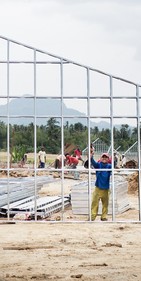 Life after a typhoon – a post-disaster power struggle
A year after typhoon Haiyan hit the Philippines, leaving 6000 dead and 4 million homeless, the arranged marriage between the country and its aid workers is showing signs of strain. The main point of contention: who’s in charge of humanitarian relief? Photographer Pieter van den Boogert and I delved into the workings of the humanitarian aid machine.
Life after a typhoon – a post-disaster power struggle
A year after typhoon Haiyan hit the Philippines, leaving 6000 dead and 4 million homeless, the arranged marriage between the country and its aid workers is showing signs of strain. The main point of contention: who’s in charge of humanitarian relief? Photographer Pieter van den Boogert and I delved into the workings of the humanitarian aid machine.



